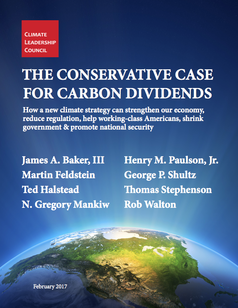 Author: James Morton Turner On July 19, 2018, the House passed an anti-carbon tax resolution. Considering the party’s position on climate change and its opposition to taxes, that came as little surprise. Since 2013, conservative interest groups such as the Koch-funded group Americans for Prosperity, had urged Republicans to sign a “No Climate Tax” pledge. What has been more surprising have been several Republican-led initiatives in support of a carbon tax. In February 2017, old-guard Republicans, including former Secretary of State George P. Shultz (Reagan administration), Secretary of the Treasurer James Baker (Reagan administration) and Henry Paulson (George W. Bush administration), called for tax and dividend approach to carbon dioxide regulation where carbon is taxed, but the revenue is rebated back to businesses and citizens. In June 2018, a newly formed political action committee, Americans for Carbon Dividends, co-chaired by two former U.S. senators with strong ties to the oil and gas industry began laying the groundwork for a campaign in support of tax and dividend carbon legislation, in exchange for rolling back other energy and environmental regulations. On July 23, 2018, Representative Carlos Cubelo (R-Florida) introduced a carbon tax, the revenues of which would be used to support infrastructure improvement. As we explain in our book, The Republican Reversal, moderate Republicans championing market-based strategies have played a pivotal role in key moments of American environmental policy, including addressing acid rain through the Clean Air Act amendments of 1990. These events suggest that some Republicans recognize the need to forge a strategy on climate change, both to address an urgent problem and to strengthen the party’s political relevancy with younger voters. But those gains should not come at the expense of giving up other protections for the environment and human health and protecting polluters from climate change liability, as Lee Wasserman and David Kaiser have argued. If such legislation is ever to gain momentum, however, some regulatory relief will likely be necessary to oil the gears of compromise. Comments are closed.
|
AuthorWrite something about yourself. No need to be fancy, just an overview. Archives
April 2020
Categories |

 RSS Feed
RSS Feed